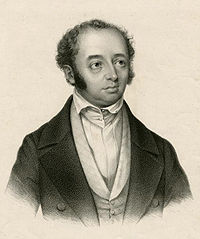Honesty compels us to neither ignore nor excuse the several anti-Semitic comments that appear in Beethoven’s letters. These are mostly directed towards the Berlin-based music publisher Adolf Martin (born Aaron Moses) Schlesinger. Beethoven accused many his music publishers of dishonesty and cheating him out of money, but in Schlesinger’s case, these accusations (expressed to others, not Schlesinger himself) were sometimes accompanied by a reference to Schlesinger’s religion.
Regardless, Beethoven had no problem with Schlesinger publishing the last three piano sonatas of Beethoven, as well as the Opus 132 and 135 String Quartets.
Schlesinger’s son Moritz Adolf Schlesinger ran the Paris-based branch of the music-publishing business, where he was known as Maurice. The Opus 132 and 135 String Quartets were published simultaneously by the Schlesingers in Berlin and Paris.
On 26 September 1825, Beethoven wrote to Moritz Schlesinger. Although the letter refers to a “most lovely bride” it’s not clear if Beethoven was congratulating Schlesinger on a recent marriage or just a general search for a wife:
I wish you the most lovely bride, my dear fellow; and on this occasion I request you to give my compliments to Herr Marx in Berlin and ask him not to be too hard on me and to let me slip out occasionally through the back door. (Beethoven Letters No. 1433)
The letter also includes a canon based on the text “Si non per portas, per muros” (“If not by the doors, then through the walls”), which seems like it should be a famous Latin aphorism applicable in numerous situations, but which is apparently a Beethoven original.
The autograph of this letter is reproduced in the appendix of this 1859 edition of Volume II of Adolf Bernhard Marx’s book on Beethoven. Go to the very end and then page back. It’s the last autograph in the book. The canon is catalogued as WoO 194:

#Beethoven250 Day 351
Canon “Si non per portas” (WoO 194), 1825
A realization of the canon in a studio recording.
The Herr Marx that Beethoven refers to in his letter is Adolf Bernhard Marx, a composer and music critic who wrote for the music journal that Schlesinger founded. He was later a Professor of Music at Berlin University and wrote a biography of Beethoven.

Adolf Bernhard Marx was instrumental in exploring more modern forms of music analysis, including establishing the music form later known as sonata form. Beethoven generally appreciated the perceptive writings of Marx about his own music.
The article “Beethoven and His Jewish Contemporaries” in the magazine Shofar includes Marx among Beethoven’s Jewish contemporaries, one of several spared from Beethoven’s anti-Semitic comments.